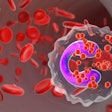
Asthma exacerbations occurring during the first year of treatment can significantly impact long-term lung function in individuals with the condition. Results of the decade-long follow-up study, “Exacerbation During the First Year of Treatment Affects Lung Function in Subjects With Asthma — a 10-Year Follow-Up,” were published in the Journal of Asthma.
The new study focused on subjects with previously untreated severe asthma, highlighting the importance of early intervention and consistent management. The authors report that although inhaled corticosteroids (ICS) are the preferred treatment for asthma because they are known for improving symptoms and reducing exacerbations, their long-term impact on lung function, especially after delayed treatment, has been unclear. This study was designed to characterize lung function trajectories and identify predictors of FEV1 decline and future exacerbations.
The study followed 184 people with asthma for 10 years, evaluating the impact off their delayed start of regular maintenance ICS treatment. Key findings include:
- Lung function decline: 54% of participants experienced an FEV1 decline above 25ml/year. Those with faster decline were generally younger, had shorter asthma duration and better lung function at the start of regular treatment.
- Exacerbations: Number of events during the first year of treatment was a strong predictor of absolute FEV1 decline and future exacerbations.
- Predictors: Time without treatment was a predictor of relative reduction in FEV1.
Most of the participants were female (84%), over the age of 50 and had early-onset asthma with a median of 30 years without regular ICS treatment.
According to researchers, the study underscores the critical impact of early exacerbations on long-term lung function in asthma patients. Regular treatment with ICS, even after a delayed start, they said, improves symptoms and quality of life. However, early exacerbations have a negative effect, emphasizing the need for timely and consistent asthma management.
Their findings also suggest that clinicians should prioritize early intervention and closely monitor patients during the first year of treatment to mitigate the risk of ongoing exacerbations and improve long-term outcomes.






















